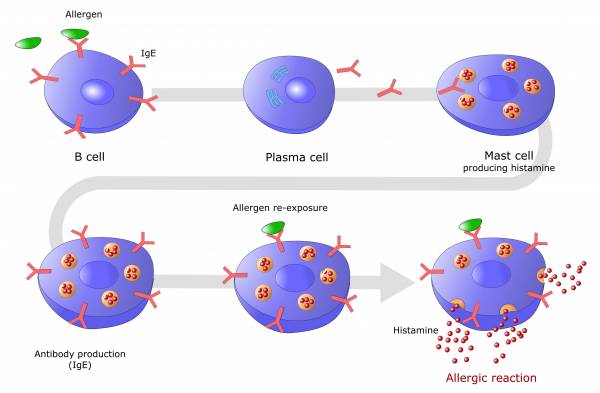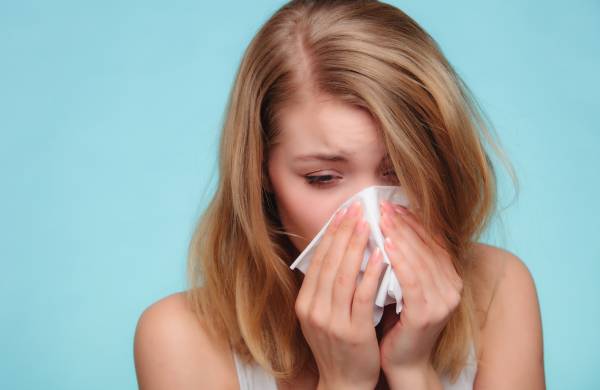Do you suffer from seasonal allergies? Is there a time of year where you suffer from headaches, migraines, runny nose, or itchy eyes? If you do, you are not alone. Millions of people suffer from these same seasonal allergies.
A high pollen count may not be to blame for your allergy symptoms.
Right now is the time of the year when pollen count is at its highest. When I leave my windows open for a few hours, my counters become covered in the yellow dust. But is the pollen the culprit our allergies or is it something else? Ask yourself: have these same symptoms continued after you tried switching to a paleo diet?
Histamines and Allergies
Pollen may not necessarily be the culprit, but instead histamine intolerance. Histamine is an organic compound involved in the immune response. Certain foods can actually release histamine in our system. Some common histamine-rich foods are dairy products, avocados, bacon, spinach, olives, eggplant, tomatoes, and even chocolate.
People without histamine intolerance will detoxify the histamine released from these foods. But people who suffer from histamine intolerance do not contain enough of the compounds that breakdown the histamine and will suffer from a wide range of symptoms that include acid reflux, heartburn, vomiting, diarrhea, nasal congestion, and fatigue.
Note: These symptoms are not always related to histamine intolerance. In some cases, the cause is simply a leaky gut. This is when undigested food particles cross the gut lining and enter our bloodstream. Our immune system responds and we suffer from these same symptoms. However, if you have histamine intolerance, healing the gut will not cure symptoms.
A Simple Solution?
You do not need expensive equipment or even to visit a doctor for a diagnosis of histamine intolerance. Simply remove histamine-rich foods and note how you feel.
“This is yet another case of all diseases starting in the gut, just like Hippocrates said. If you feel like you may suffer from histamine intolerance, then healing the gut is part of the treatment protocol.”
Some experts argue that histamine intolerance is not a real thing. But we have been down this road before with things like gluten intolerance and adrenal fatigue. There are enough people out there who have undergone a low-histamine diet to resolve symptoms to make me think there is definitely something to this.
How It Works
Histamine intolerance is commonly seen with some type of gut dysbiosis. Our gut bacteria play a role in how our food is converted in various metabolites. Some of our gut bacteria actually release histamine.1 So, it makes sense that if we have more of the bacteria that produce histamine compared to the bacteria that produce the metabolites to break it down, then we will run into some problems.

Histamines play an important role in allergic reactions.
This is yet another case of all diseases starting in the gut, just like Hippocrates said. If you feel like you may suffer from histamine intolerance, then healing the gut is part of the treatment protocol. We do this in two ways:
- Remove all foods that create a histamine response. A simple Google search for high-histamine foods will give you a thorough list.
- Add a solid dose of probiotics. This is best taken in supplement form, as fermented foods are most likely going to cause symptoms.
Being strict with the low-histamine diet is a crucial component. This can feel extremely restrictive, but as the gut heals and balance is brought back to the microbiome, people tend to be able to handle a little bit more of the histamine-producing foods.
Assess Your Medicine Cabinet
There are also some common medications that can affect our ability to tolerate histamine. These include common anti-inflammatory medications, as well as anti-depressants due to them actually altering the compounds required to breakdown histamine. If you are currently prescribed anti-depressants talk to your doctor about your symptoms and ask about alternative treatments.
When and How to Supplement
But even undertaking all these changes may not help. In order for dietary changes to work by themselves, you need to be able to get your histamine levels below your level of tolerance. This is extremely variable from person to person.
“You do not need expensive equipment or even to visit a doctor for a diagnosis of histamine intolerance. Simply remove histamine-rich foods and note how you feel.”
If you are on a low-histamine diet and have removed foods and medications that may be increasing histamine levels, but still suffer from symptoms, then you may need to add a supplement into your regimen. These supplements are known as DAO (diamine oxidase) supplements.
DAO is the compound that breaks down histamine in the human body, but tends to be low in people with histamine intolerance. These supplements are relatively cheap and can be purchased for about thirty dollars. A small price to pay to be alleviated from some really uncomfortable symptoms.

Adding a DAO supplement can help alleviate uncomfortable symptoms.
Have You Been Misdiagnosed?
If you suffer from seasonal or chronic allergy symptoms such as runny nose, itchy eyes, gastrointestinal distress, fatigue, or one of the many other symptoms associated with an allergy response, all is not lost. You may actually have a histamine intolerance.
Switching to a low-histamine diet while taking a quality probiotic and DAO supplement just may be enough to alleviate your symptoms and improve your quality of life.
Further Reading:
- 2 Strategies for Simple Allergy and Sinus Relief
- Understanding Your Adrenal System: Norepinephrine
- The Whole Truth About Soy Lecithin
- New on Pulse Beat Fit Today
References:
1. Hemarajata, Peera and James Versalovic. “Effects of probiotics on gut microbiota: mechanisms of intestinal immunomodulation and neuromodulation.” Therap. Adv. Gastroenterology 2013. Retrieved on June 17, 2015.
Photos courtesy of Shutterstock.






